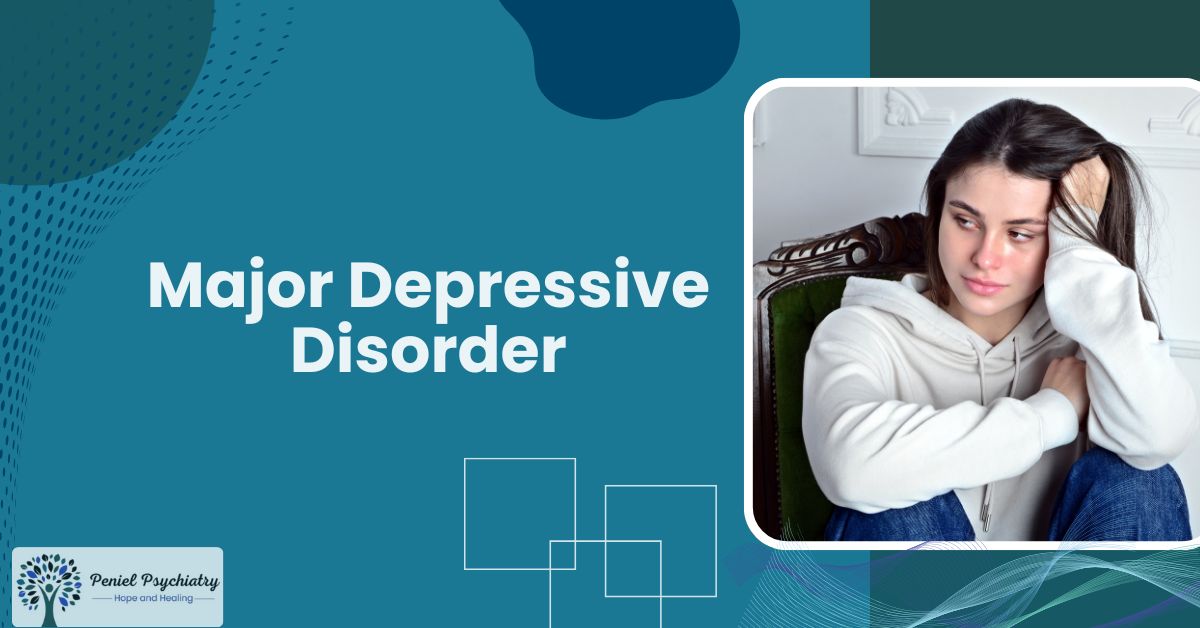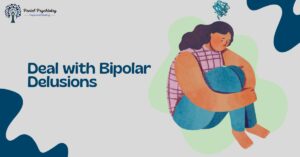Major Depressive Disorder is a serious type of depression that affects many people. It is more than just feeling sad. It can cause a low mood that lasts most of the day. People may lose interest in activities they once enjoyed. They may feel tired, have trouble sleeping, or eat more or less than usual. Thinking clearly can become hard.
Depression can also affect work, school, and relationships. A mix of family history, brain chemistry, stress, or health problems may cause it. Understanding the symptoms and treatment options is very important. Therapy, medicine, and small lifestyle changes can help. With support, people can feel better and start enjoying life again.
Common Signs and Symptoms of Major Depressive Disorder
Major Depressive Disorder can show up in many ways. It is more than feeling sad for a few days. People with MDD often notice changes in mood, energy, and daily habits. These changes can make it hard to work, study, or even enjoy simple activities. Recognizing the signs early can help people get the support they need.
Persistent Low Mood
One of the main symptoms of major depression is a low mood that lasts most of the day. People may feel sad, empty, or hopeless. This feeling often does not go away with normal cheering up. It can affect how someone thinks, acts, and interacts with others.
People with MDD often stop enjoying things they once liked. Hobbies, social events, or favorite activities may feel uninteresting. This loss of interest can make daily life feel dull or tiring.
Changes in Sleep
Depression can cause sleeping problems. Some people sleep too much, while others struggle to fall asleep or stay asleep. These sleep changes can make fatigue worse and affect focus and mood.
MDD can affect eating habits. Some people eat less and lose weight. Others may eat more and gain weight. These changes are often linked to mood and energy levels.
Low Energy and Fatigue
Feeling tired all the time is common. Even small tasks can feel exhausting. People may struggle to get out of bed, go to work, or complete daily chores. Depression can make it hard to focus or remember things. Decision-making may feel slow or confusing. This symptom can impact work, school, and personal life.
Feelings of Guilt or Worthlessness
People with MDD may blame themselves for things outside their control. They may feel worthless or like a burden to others. These feelings can worsen sadness and affect relationships.
Some people may think about hurting themselves or ending their lives. This is serious. Anyone experiencing these thoughts should reach out to a trusted adult or professional immediately.
What Causes Major Depressive Disorder
Major Depressive Disorder does not have a single cause. It usually happens because of a combination of factors. Genetics, brain chemistry, stressful life events, and medical conditions can all play a role. Understanding these causes can help people realize that depression is not their fault.

Genetics and Family History
Depression can run in families. If a close family member has experienced MDD, the risk can be higher. Genes may influence how the brain regulates mood and stress. This does not mean someone will definitely develop depression, but it increases vulnerability.
Brain Chemistry
Brain chemicals, called neurotransmitters, help control mood and emotions. Imbalances in these chemicals can contribute to depression. Changes in serotonin, dopamine, and norepinephrine are often linked to depressive symptoms like low energy, low mood, and emotional numbness.
Stressful Life Events
Major stressors, such as losing a loved one, relationship problems, job loss, or financial struggles, can trigger depression. Even smaller, ongoing stress, like daily pressure at work or school, can have an impact over time. These events can affect mood and energy levels.
Medical Conditions and Hormonal Changes
Chronic illnesses, like diabetes, heart disease, or thyroid problems, can increase the risk of depression. Hormonal changes, including postpartum shifts or menopause, may also contribute. Some medications and substance use can worsen depressive symptoms.
Who Is More at Risk for Major Depressive Disorder
Major Depressive Disorder can affect anyone, but some people are more likely to develop it. Risk factors include genetics, lifestyle, health, and life experiences. Knowing who is at higher risk can help with early recognition and support.
Family History of Depression
People with close relatives who have had MDD are more at risk. Genetics can affect how the brain regulates mood. While having a family history does not guarantee depression, it increases vulnerability.
Ongoing Stress and Trauma
Chronic stress, such as work pressure or financial struggles, can contribute to depression. Past trauma, including abuse or loss, can also increase the risk. Stressful events may trigger depressive symptoms like low energy or emotional numbness.
Chronic Illness and Hormonal Changes
Medical conditions such as diabetes, heart disease, or thyroid problems can make depression more likely. Hormonal changes, including postpartum shifts and menopause, can affect mood. Some medications may also contribute to depressive symptoms.
Age and Social Factors
Depression can affect anyone, but teenagers, young adults, and older adults are more vulnerable. Social isolation, lack of support, or significant life changes can increase risk. Feeling disconnected from others often worsens low mood and loss of interest in activities.
How Major Depressive Disorder Affects Daily Life
Major Depressive Disorder can make everyday life feel overwhelming. It affects energy, motivation, and focus. Simple tasks can become difficult. Understanding how MDD impacts daily routines helps people recognize the importance of support and treatment.
Work and School Challenges
Depression can make concentrating on or completing tasks hard. People may feel exhausted, unmotivated, or easily frustrated. Performance at work or school can drop, even if the person is usually capable.
Relationships and Social Life
MDD can affect family, friends, and social connections. People may withdraw from social events or struggle to communicate their feelings. Emotional numbness or irritability can strain relationships.
Self-Care and Daily Tasks
Routine tasks like cooking, cleaning, or personal hygiene can feel exhausting. Low energy and fatigue make completing simple chores difficult. This can lead to frustration and heightened feelings of guilt or worthlessness.
Physical Health and Well-Being
Depression can cause sleep changes, appetite shifts, and fatigue. Chronic stress from depressive symptoms may affect the immune system and overall physical health. Low mood and lack of motivation can prevent people from staying active or following healthy habits.
Diagnosis: How Doctors Identify Major Depressive Disorder
Getting the correct diagnosis is an essential step in managing Major Depressive Disorder. Doctors look at symptoms, duration, and how they affect daily life. A careful evaluation helps distinguish MDD from temporary sadness or other health conditions.

Clinical Evaluation
During a clinical evaluation, a doctor or mental health professional asks about mood, energy, sleep, appetite, and daily routines. Honest answers help identify depressive symptoms and guide treatment options.
Screening Tools
Standard questionnaires, like the PHQ-9, help measure the severity of depression. These tools allow doctors to see how low mood, loss of interest, or fatigue affects everyday life.
Medical and Psychological History
Doctors also consider family history, past mental health conditions, chronic illnesses, and medications. This information helps recognize patterns and potential causes of depression.
When to Seek Professional Help
If low mood, lack of interest, or fatigue lasts for more than two weeks, it is essential to talk to a professional. Early evaluation can prevent worsening symptoms and support faster recovery.
Treatment Options for Major Depressive Disorder
Major Depressive Disorder can be treated successfully with the proper support. Treatment often combines medication, therapy, and lifestyle changes. Each person’s plan may be different. Understanding options helps people make informed decisions and feel hopeful.
1. Medications
Antidepressants, such as SSRIs or SNRIs, help balance brain chemicals that affect mood. These medicines can improve energy, sleep, and overall mood. It may take a few weeks to feel the full benefits. Doctors carefully monitor for side effects and adjust doses as needed.
2. Therapy and Counseling
Talking to a therapist can help people manage stress and depressive symptoms. Cognitive Behavioral Therapy (CBT) and supportive counseling are common approaches. Therapy helps with negative thinking, problem-solving, and coping skills.
3. Lifestyle Support
Small lifestyle changes can improve well-being. Regular exercise, healthy eating, good sleep habits, and reducing alcohol can help. Building a support system of family and friends also strengthens recovery.
4. Other Treatments
For some people, additional treatments may be considered. These include Transcranial Magnetic Stimulation (TMS) or newer therapies like ketamine under professional care. These options are usually for people whose symptoms do not fully improve with standard treatments.
Can Major Depressive Disorder Come Back?
Major Depressive Disorder can return even after treatment. Knowing the signs of relapse and maintaining support can help manage symptoms early. Long-term care and follow-up are essential for lasting recovery.
Understanding Relapse
Relapse happens when depressive symptoms come back after a period of improvement. It is common and does not mean treatment has failed. Recognizing early signs can prevent symptoms from worsening.
Early signs include persistent low mood, loss of interest in activities, fatigue, changes in sleep or appetite, and difficulty concentrating. Noticing these changes early allows for timely action and support.
Regular check-ins with a doctor or therapist help monitor mood, energy, and overall mental health. Follow-ups ensure treatment is effective and adjustments are made if needed.
Support from family, friends, or support groups strengthens recovery. Healthy routines, therapy, and sometimes ongoing medication can reduce the risk of relapse and help maintain a stable mood over time.
How to Support Someone With Major Depressive Disorder
Supporting a loved one with Major Depressive Disorder can make a real difference. Understanding their needs and offering gentle help can improve recovery. Small actions and consistent care can show support.
Listen and Show Understanding
One of the best ways to help is by listening. Let them share feelings without judgment. Acknowledge their emotions and avoid telling them to “just cheer up.” Listening can reduce feelings of isolation.
Gently encourage them to see a doctor or therapist if they haven’t already. Offer to help schedule appointments or accompany them. Professional support, including therapy and medication, is essential for recovery.
Depression can make daily tasks exhausting. Helping with meals, chores, or errands can ease their burden. Small actions show care and reduce stress, allowing them to focus on recovery.
Recovery takes time. Avoid expressing frustration if progress seems slow. Regular check-ins, kind messages, or shared activities help maintain connection and provide emotional support. Your patience can strengthen their sense of safety and belonging.
When to Seek Immediate Help for Major Depressive Disorder
Sometimes, Major Depressive Disorder can become severe. Sure signs show that a person needs urgent professional help. Acting quickly can prevent serious harm. Knowing these warning signs helps friends, family, and the person affected respond in time.

Thoughts of Self-Harm or Suicide
If someone talks about hurting themselves or ending their life, it is critical to seek help immediately. These thoughts are serious and need professional attention. Call a trusted doctor, mental health professional, or emergency services without delay.
Sudden, intense sadness, irritability, or withdrawal from everyone can signal danger. Changes in sleep, appetite, or energy that worsen quickly also require urgent attention. Early action can prevent symptoms from escalating.
When fatigue or low energy makes it impossible to eat, bathe, or manage basic tasks, professional support is essential. This level of impairment may indicate severe depressive symptoms that cannot be handled alone.
How Peniel Psychiatry Helps Patients With Major Depressive Disorder
Peniel Psychiatry provides professional care for people living with Major Depressive Disorder. Their goal is to make treatment safe, effective, and supportive. Patients receive personalized care that addresses both symptoms and daily challenges. Understanding the options can help individuals feel confident seeking help.
Every patient begins with a detailed evaluation. Doctors check for depressive symptoms, mood patterns, energy levels, and emotional changes. They also review medical history and family background. This thorough assessment ensures the correct diagnosis and treatment plan.
Medication Management
Peniel Psychiatry offers careful management of antidepressant medications. Doctors select treatments based on individual needs and monitor progress. Adjustments are made as necessary to improve mood, sleep, and energy while minimizing side effects.
Patients have access to therapy sessions tailored to their situation. Cognitive Behavioral Therapy (CBT) and counseling help manage stress, negative thinking, and low motivation. The team also guides patients in building coping strategies and strengthening their support systems.
Getting help is the first step toward feeling better. You can easily book an appointment online or call Peniel Psychiatry at +1 877-893-3842 to speak with a professional. Early support can make a big difference in managing depressive symptoms and improving daily life.
Conclusion
Major Depressive Disorder is a serious condition, but it can be treated effectively. Understanding symptoms, causes, and treatment options helps people take the proper steps toward recovery. Therapy, medication, lifestyle support, and professional guidance all play essential roles. With early help and consistent care, life can gradually become more manageable. Seeking support from family, friends, and professionals is necessary for lasting improvement.
Frequently Asked Questions (FAQ)
Is Major Depressive Disorder the same as regular sadness?
No. MDD involves persistent low mood, loss of interest, fatigue, and other depressive symptoms. Regular sadness usually passes on its own.
Can MDD go away without treatment?
Some mild cases may improve, but professional treatment dramatically increases the chances of recovery and reduces the risk of relapse.
How long does treatment take?
Treatment varies by individual. Some people notice improvement in a few weeks, while others may need months of therapy, medication, or both.
Can lifestyle changes help?
Yes. Regular exercise, healthy eating, good sleep, and support from loved ones can improve mood and energy levels.
Is medication safe?
When prescribed and monitored by a doctor, antidepressants are generally safe and effective. Doctors adjust treatment based on needs and side effects.
When should I see a psychiatrist?
Seek professional help if low mood, loss of interest, fatigue, or emotional numbness lasts more than two weeks. Immediate help is needed if thoughts of self-harm occur.




